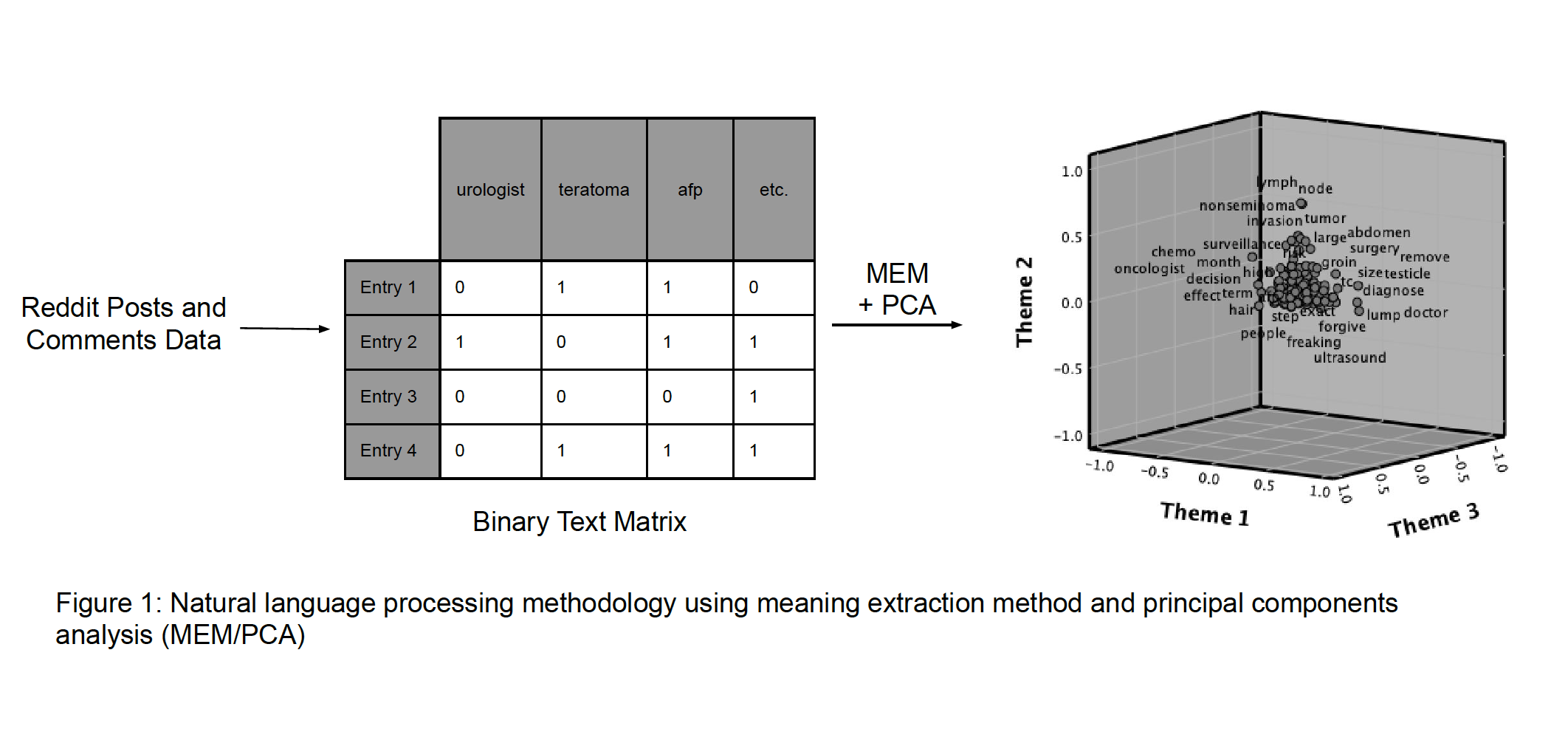Back
Poster, Podium & Video Sessions
Moderated Poster
MP46: Penile & Testicular Cancer I
MP46-05: Characterizing Online Testicular Cancer Discussions with Quantitative Thematic Analysis
Sunday, May 15, 2022
1:00 PM – 2:15 PM
Location: Room 222
Krishna Ravivarapu*, Alexander Small, Micah Levy, Chih Peng Chin, Evan Garden, Osama Al-Alao, Joseph Sewell Araya, Michael Palese, New York, NY
- KR
Krishna Teja Ravivarapu, BA
Medical Student
Icahn School of Medicine at Mount Sinai
Poster Presenter(s)
Introduction: Patients are increasingly turning to the internet to crowdsource community support and medical advice. This is especially true for younger patient populations like those affected by testicular cancer. Extracting information from online discussions can facilitate better counseling and care by giving providers insights into prevailing concerns, common misconceptions, and shared emotions. We aim to use quantitative natural language processing methodology to identify key themes of discussion in one of the internet’s largest testicular cancer forums.
Methods: We extracted three years of posts (08/2016 to 08/2019) and comments (01/2017 to 12/2019) from the 3,593 member Reddit community r/testicularcancer. The dataset was analyzed by a meaning extraction method followed by principal component analysis (MEM/PCA) to computationally distill major themes of discussion (Figure 1). Kaiser-Meyer-Olkin Measure of Sampling Adequacy (>0.60) and Bartlett’s test of sphericity ( <0.001) indicate that the data is suitable for MEM/PCA.
Results: 17,423 posts and comments were analyzed with MEM/PCA to generate five major themes of discussion, ranked by prevalence: 1) chemotherapy and side effects 2) medical evaluation after self-identifying an anomaly, 3) cancer diagnosis and surgery, 4) blood test result discussion of specific tumor markers, and 5) medical decision-making. Users seeking medical advice, such as questions about self-identified testicular anomalies (“lump” 5.2%), are consistently referred to medical evaluation (“urologist” 6.3%, “oncologist” 5.3%). Posts can be very technical, referring to forms of testicular cancer (“seminoma” 4.1%, “embryonal [carcinoma]” 1.1%, “teratoma” 1.1%, “yolk [sac] carcinoma” 0.6%, and “choriocarcinoma” 0.3%) as well as specific tumor markers (“AFP” 1.5%, “HCG” 1.1%, “LDH” 0.6%). Regarding “chemotherapy” (17.5%), “hair [loss]” (2.4%) is a major concern.
Conclusions: Social media forums allow patients to express unbiased and uninhibited thoughts and concerns. These anecdotes can collectively influence patient attitudes and approaches. Therefore, it is important for providers to be aware of the key topics of discussion on social media to connect better with their patients, improving shared decision-making, patient satisfaction, and care.
Source of Funding: None.

Methods: We extracted three years of posts (08/2016 to 08/2019) and comments (01/2017 to 12/2019) from the 3,593 member Reddit community r/testicularcancer. The dataset was analyzed by a meaning extraction method followed by principal component analysis (MEM/PCA) to computationally distill major themes of discussion (Figure 1). Kaiser-Meyer-Olkin Measure of Sampling Adequacy (>0.60) and Bartlett’s test of sphericity ( <0.001) indicate that the data is suitable for MEM/PCA.
Results: 17,423 posts and comments were analyzed with MEM/PCA to generate five major themes of discussion, ranked by prevalence: 1) chemotherapy and side effects 2) medical evaluation after self-identifying an anomaly, 3) cancer diagnosis and surgery, 4) blood test result discussion of specific tumor markers, and 5) medical decision-making. Users seeking medical advice, such as questions about self-identified testicular anomalies (“lump” 5.2%), are consistently referred to medical evaluation (“urologist” 6.3%, “oncologist” 5.3%). Posts can be very technical, referring to forms of testicular cancer (“seminoma” 4.1%, “embryonal [carcinoma]” 1.1%, “teratoma” 1.1%, “yolk [sac] carcinoma” 0.6%, and “choriocarcinoma” 0.3%) as well as specific tumor markers (“AFP” 1.5%, “HCG” 1.1%, “LDH” 0.6%). Regarding “chemotherapy” (17.5%), “hair [loss]” (2.4%) is a major concern.
Conclusions: Social media forums allow patients to express unbiased and uninhibited thoughts and concerns. These anecdotes can collectively influence patient attitudes and approaches. Therefore, it is important for providers to be aware of the key topics of discussion on social media to connect better with their patients, improving shared decision-making, patient satisfaction, and care.
Source of Funding: None.


.jpg)
.jpg)